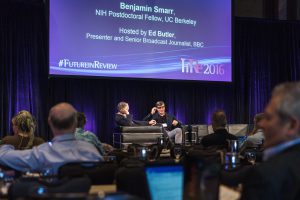Listening to the Flow of Circadian Rhythms
By Shelby Cate
We have known for a long time that shift workers develop health problems, that eating at night is bad for you, and that jet lag isn’t fun. According to Benjamin Smarr, an NIH Postdoctoral Fellow at UC Berkeley, they all have temporal affects these behaviors have on circadian rhythms in common. BBC Host Ed Butler interviewed Smarr about his research and the idea of flows, which Smarr says fits “incredibly well” into how he thinks about biology.
According to Smarr, circadian rhythms are the flow of metabolites, hormones, and other biomarkers that transmit information between organs in the body. These flows follow temporal patterns across days, years, and social behaviors. For Smarr, the important question is “where am I in the flow of information in my body” and how can that information be utilized?
Smarr is particularly interested in monitoring temperature changes, both because it is easy to measure and because it is influenced by many different regulatory metabolites that interact, such as insulin, estrogen, and cortisol. Traditional tests, like those from a blood draw, give a snapshot of biomarkers at a point in time without any information on temporal changes.
“It’s not which biomarker, but it’s understanding that time really matters in biology,” he said. “[It’s] not just looking at the biomarker, but looking at the flow over time.”
Smarr believes that the applications of understanding circadian rhythms will extend beyond just health applications and into such fields as mental optimization that could be applied to education. Smarr draws the analogy between understanding flows in metabolites to listening to music.
“I could ask ‘what is the amplitude of radio waves in this room’, and I could measure it a couple of times a day and that would tell me something,” he said. “But I could do that until I die without realizing I’m listening to music.”
To discover more or read other articles from the conference, visit StratNews.com or our Medium blog.
